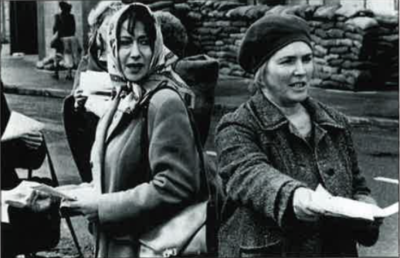Terry George’s latest movie, Some Mother’s Son, is a universal story which will haunt long after the final credits run, writes Laoise MacReamoinn.
There’s a savage irony in the opening sequence of Some Mother’s Son. In newsreel footage from 1979, Margaret Thatcher, British prime minister-elect, greets the press, and with a sweet, thin smile claims to see herself as continuing the work of no less a personage than St. Francis of Assisi.
Less than two years later, Northern Ireland and the wider world reeled at the tragic unnecessary deaths of Bobby Sands and nine young men who died with him on hunger strike in the H-Blocks in Long Kesh prison outside Belfast. Compassion, it seemed, was reserved for British rhetoric.
Director Terry George (co-writer of the highly acclaimed In the Name of the Father) highlights these events in a universal story told through the eyes of the mothers. What does a mother do when her young son opts to die for a cause? In the case of the hunger-strikers, the families had the fight to intervene when their sons lost consciousness. It was a choice no one should have to make but one which was forced on them, when time was running out and political factions on all sides dithered.
This is a story of two such mothers from very different backgrounds, of the sons they love, the bond they forge and the very personal decisions they must make when all else fails.
Annie Higgins (Fionnula Flanagan) and Kathleen Quigley (Helen Mirren) first meet when their sons are arrested after an IRA attack on a British patrol. For Annie, it’s something she has long feared. She has endured much since the start of the Troubles, and her beloved Frankie (David O’Hara) is a wanted man. For Kathleen, a middle-class widow who teaches at a convent school, the discovery that her son (Aidan Gillen) is involved is a bolt out of the blue. Annie and Kathleen, flung together in their helplessness, must do what they can.
Hollander played his part so well, in fact, that following the New York premiere movie-goers who saw him in person were itching to get their hands on him.”
To portray the events of that terrible time through the eyes of two mothers was an ingenious idea. By placing the protagonists outside the conflict — in a politically active sense — places the emphasis on the human dilemma, hinging on questions of respect, loyalty, honor and, overwhelmingly, love. Universal questions which give the film a broad-based appeal.
The two actresses play beautifully against each other, the chasm between them is always acknowledged and only occasionally bridged. Helen Mirren is perfectly cast as Kathleen, who wavers between two words — the one she knows and the ugly world of life and death and deals which she thought only happened to other people. Mirren brings the skill into the final scene the prison, where she is heartbreakingly convincing as a mother facing the decision over life and death.
Fionnula Flanagan, too, gives a powerful and resonant performance, bringing to Annie the face of a woman who’s seen great sadness but who has all the joys of the earth in her. Annie as played by Flanagan is no caricature of a hearty farmer’s wife, or canny peasant cipher, but a resilient woman, stubborn and brave. Flanagan is at her best when she slowly allows Annie’s vulnerability to show through.
Tom Hollander, who plays the insufferable British diplomat Farnsworth with a practiced ease, also gives an outstanding performance. Hollander played his part so well, in fact, that following the New York premiere movie-goers who saw him in person were itching to get their hands on him. “If I saw him now I think I would hit him,” one remarked, still in the grips of this intensely powerful movie.
David O’Hara and Aidan Gillen, as the two sons, also add to the strength of the movie, while John Lynch brings life as well as reverence to his portrayal of Bobby Sands.
That omnipresent Irish actor Gerry McSorley is a wonderfully convincing priest, trying to press the mothers into stopping the hunger strikes and becoming a patsy for the British in the process, while Tim Woodward, who plays Harrington from the British Foreign Office, also turns in a rock solid performance.
The movie has powerful pace, thanks to magnificent editing and a pounding scorn written by Irish composer Bill Whelan. There’s an extraordinary scene of a bomb attack cross cut with an Irish dancing class, where the girls’ white socks and black shoes flying and clattering are a sort of dark parody of Riverdance, which, of course, Whelan also composed.
Scenes unfold in an unforced uncluttered way, and the gradual build-up of emotion as the clock ticks has profound impact. Terry George merged a terrific cast into an equally terrific movie which will haunt long after the final credits ran. We know these people. They could be us.
Editor’s Note: This article was originally published in the January/February 1997 issue of Irish America. ⬥


Leave a Reply